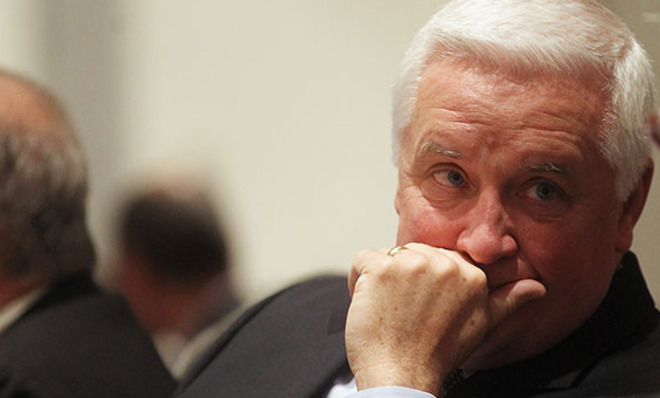
Will democrats clean up in 2014 gubernatorial races?
- Select a language for the TTS:
- UK English Female
- UK English Male
- US English Female
- US English Male
- Australian Female
- Australian Male
- Language selected: (auto detect) - EN
Play all audios:

In 2010, Republicans capitalized on a perfect storm of political circumstances to retake the House in resounding fashion. And at the state level, too, the GOP made big gains and dominated
the gubernatorial contests. Before the election, Democrats held a 26-23 advantage in governorships. After the election, Republicans led 29-20, including key pickups in swing states like
Florida, Ohio, and Pennsylvania. (In each case, there was one independent governor.) Today the margin is 30-20 in favor of the GOP. After being elected, several of those first-term governors
moved hard to the right, and are now facing difficult re-election bids; a few appear headed for landslide defeats. As a result, Democrats are in solid shape. They may not retake the overall
governorship edge, but they'll at least make a significant dent in it come 2014. SUBSCRIBE TO THE WEEK Escape your echo chamber. Get the facts behind the news, plus analysis from
multiple perspectives. SUBSCRIBE & SAVE SIGN UP FOR THE WEEK'S FREE NEWSLETTERS From our morning news briefing to a weekly Good News Newsletter, get the best of The Week delivered
directly to your inbox. From our morning news briefing to a weekly Good News Newsletter, get the best of The Week delivered directly to your inbox. To be sure, Democrats don't have the
kind of momentum Republicans enjoyed heading into 2010. But the missteps of some newbie governors have made them unpopular at home, and vulnerable to challengers. Take Pennsylvania Gov. Tom
Corbett (R) who, according to one poll, is the most unpopular governor in the nation with a horrendous 24 percent approval rating. A separate survey released this week found that majorities
of voters disapproved of Corbett's job performance and thought he did not deserve re-election. More pertinently, the poll found Corbett trailing against all seven hypothetical
challengers paired against him, some of them relative unknowns. So where did Corbett do wrong by his constituents? Pretty much everywhere. Overwhelming majorities of voters don't like
how he's handled taxes, health care, the economy, education, spending, and the Penn State football scandal, per Quinnipiac. Corbett also resisted stiffer gun control, though 94 percent
of the state supports tougher background checks. A free daily email with the biggest news stories of the day – and the best features from TheWeek.com In Corbett's most high-profile
blunder, he compared gay marriage to incest. And though a healthy majority of Pennsylvania voters support marriage equality, he ordered the state's attorney's to defend
Pennsylvania's ban on gay marriage in court. The attorneys' latest tactic: Demanding the sexual history of the plaintiffs in the case. Corbett isn't alone. The approval
ratings for Michigan Gov. Rick Snyder and Florida Gov. Rick Scott are also well underwater. Both governors, like Corbett, charted conservative courses after their elections, and have seen
their standings rapidly erode. Scott's situation in particular is an incredible case of buyer's remorse. He won in 2010 by a single percentage point over his Democratic opponent,
but he's now so unpopular that he trails former Gov. Charlie Crist — yes, that Charlie Crist, the Republican turned Independent turned Democrat who was practically booed out of his own
Senate race four years ago. Though Florida voters still don't exactly feel great about Crist — he's about as popular as he is unpopular — they've given him a double-digit lead
in some surveys. Even Scott's internal polls show him losing. Then there are Wisconsin and Ohio, where union-busting governors Scott Walker and John Kasich saw their approval ratings
bottom out in the 30s shortly after taking office. Both have since improved their standing, though they're still locked in tight contests. Kasich has a slight lead in his race — but
against a challenger whom three-fourths of the state have never heard of. We've seen this same trend play out on a smaller scale already. Consider Minnesota, which in 2010 gave
Republicans control of both chambers of the Minnesota Legislature for the first time in four decades. The GOP majority immediately pushed an unpopular ballot measure to make gay marriage
unconstitutional and, just two years later, voters put Democrats back in power. Adding to Republicans' woes, the party has to play defense in 2014. Of the 36 governorships up for grabs
next year, Republicans now hold 22. Anything could happen to shake up the races between now and next November. Still, the electoral map seems to be in Democrats' favor. And if those
unpopular GOP governors don't turn things around for themselves, the Republican gubernatorial wave of 2010 could soon roll back out to sea.
